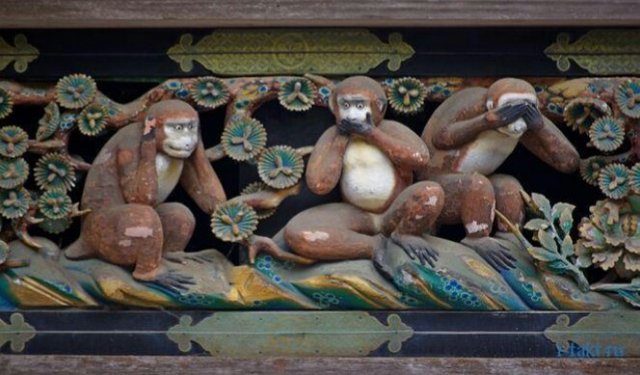I do not see anything, I do not hear anything, I will not tell anyone.

Bu ifade bize Doğu'dan ya da Budizm'den geldi. Bu görmemezlikten (göremiyorum), başka kulaklar (şey duymuyorum) ve bir ağız döner bunlardan biri üç bilge maymun, ile ilişkilidir "hiçbir şey kimseye söylemem."cümlenin anlamı o ondan biz dönmeliyiz kötülükten kendilerini korumaktır - "Ben, hiçbir şeytan görme duyar ve bu konuda hiçbir şey söylemiyorum, ben onu korudu yoksa" Bazen dördüncü maymun eklendi - Sedzaru, ilkesini simgeleyen "kötülük işlemezler." Karnı veya kasıklarını kapsayan tasvir edilebilir.Maymunların bir sembol olarak seçilmesi, Japonca kelimelerin oyunuyla ilişkilidir. "Ben, hiçbir şey duymak, hiçbir şey görmüyorum hiçbir şey söylemek" ifadesi "midzaru, kikadzaru, ivadzaru" biten Japon "maymun" kelimesini ile "Zaru" ünsüz gibi geliyor.Batıda, "Üç Maymun", Nikko Japon kentinde ünlü Şinto tapınağı Tosegu kapılarına üzerinde heykel sayesinde XVII yüzyıldan beri popüler hale gelmiştir.Benzer bir ifade Konfüçyüs "Lun Yu" (Çin) kitabındadır: "Neyin yanlış olduğuna bakmayın; Yanlış olanı dinlemeyin; Yanlış olanı söyleme; Yanlış olanı yapma. "
This expression came to us from the East, or rather from Buddhism. It is associated with three wise monkeys, one of which closes the eyes (I see nothing), the other ears (do not hear anything) and one more mouth "I will not tell anyone anything."The meaning of the phrase is that in order to protect oneself from evil, it is necessary to abandon it - "If I do not see evil, do not hear about evil and do not say anything about it, then I am protected from it." Sometimes a fourth monkey, Sadzaru, is added, symbolizing the principle of "not doing evil." She can be portrayed covering her belly or crotch.
The choice of monkeys as a symbol is connected with the play of words in the Japanese language. The phrase "I do not see anything, I do not hear anything, I do not say anything" sounds like "mizar, kikazaru, ivazaru", the ending of "zara" is consonant with the Japanese word "monkey".In the west, "Three Monkeys" have become popular since the 17th century, thanks to the sculpture above the doors of the famous Shinto shrine Tosiogu in the Japanese city of Nikko.A similar phrase is in the book of Confucius "Lun Yu" (China): "Do not look at what is wrong, Do not listen to what is wrong, Do not say what's wrong, Do not do what's wrong."
Image1
This post has received a 4.10% upvote from thanks to: @camal!!!
thanks to: @camal!!!
For more information, click here!!!!
If you use our Robot before your post has 1 day and get an Upvote greater than 1%, you will automatically receive Upvotes between 1% and 10% as a bonus from our other robots.
Congratulations @camal! You have completed the following achievement on the Steem blockchain and have been rewarded with new badge(s) :
Click on the badge to view your Board of Honor.
If you no longer want to receive notifications, reply to this comment with the word
STOPTo support your work, I also upvoted your post!
Congratulations @camal ! You received a 15% upvote from @kryptoniabot & @kryptonia for your task of 2978 SUP Today.
Remember to receive votes from @kryptoniabot
Run a task on Kryptonia.*Join free here Kryptonia Account
Use the tags KRYPTONIA or SUPERIORCOIN in your Steemit post.
Delegate to the Kryptonia Upvote by clicking links: 10SP , 50SP , 100SP , 500SP , 1000SP
Due to an increased amount of tasks, we have changed up the voting power to evenly spread out the Upvote amount.